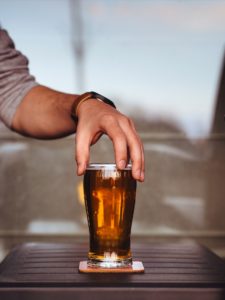
Binge drinking is defined as a pattern of consuming alcohol that raises the blood alcohol concentration levels to 0.08 g/dl. This typically is 4 drinks for women, and 5 for men in a two hour period, according to the National Institute of Alcohol Abuse and Alcoholism (NIAAA) [1] at least 1 time in the past month.
Binge drinking is one of the most common patterns of excessive alcohol use, especially on college campuses within the US.
According to various surveys, one in six US adults binge drink 4 or more times per month; binge drinking is more common among those with incomes of $75,000 or higher and approximately 92% of US adults who drink excessively report binge drinking in the past 30 days.
Binge drinking is also associated with various health problems such as intentional and unintentional injuries, liver disease, and neurological damage [2, 3]. For those over 60 years of ave and older, binge drinking is defined as no more than 3 drinks for men and 2 for women [3].
What is Alcoholism?
Alcohol use disorder, or alcoholism, is a pattern of alcohol use that involves problems controlling your drinking, being preoccupied with alcohol, continuing to use alcohol even when it causes problems, having to drink more to achieve the same effect, and having withdrawal symptoms when you stop drinking [5].
Alcoholism can be mild, moderate, or severe based on the number of symptoms a person shows. Signs can be unable to limit the amount of alcohol you drink, wanting to cut back or stop but are unable to, spending much time getting alcohol, thinking about it, or recovering from it.
Other symptoms include strong urges to drink, failing to fulfill major work obligations, school or home responsibilities, and giving up social and work activities or hobbies to use.

According to the Centers for Disease Control and Prevention found that 1 in 3 Americans drink excessively but do not necessarily have an alcohol addiction [4]. The results also showed excessive drinking includes two things, binge drinking, and heavy daily drinking.
Heavy daily drinking was defined as 8 or more drinks per week for women or 15 for men. The results also showed that 90% of people who heavily drink are not considered alcoholics.
Another study by the National Survey on Drug Use and Health on drinking patterns between 2009-2011 found the prevalence of alcohol dependence was 10.2% among excessive drinkers, 10.5% among binge drinkers, and ⅓% for non-binge drinkers [4].
Alcoholism is influenced by both genetic and environmental factors and can last a person’s lifetime.
It it typically predictable and has recognizable symptoms [6].
How Binge Drinking Different from Alcoholism
Binge drinkers are not typically alcohol dependent. Individuals may rely on alcohol to relieve stress or to manage daily life, but that does not immediately mean alcohol dependence [7].
Those who binge drink are not typically physically dependent upon alcohol and their bodies can function without alcohol in their bloodstream and can go months between binges.
Alcoholism may involve binge drinking, but all binge drinkers are not alcoholics. Both do represent an unhealthy relationship with alcohol and an inability or unwillingness to moderate one's consumption of alcohol.

The National Institute of Health (NIH) defines alcoholism as drinking despite negative consequences, drinking alone and trying to hide alcohol use. Typically alcoholics maintain a poor diet, need alcohol to get through the day, and tend to miss work/school or social activities due to drinking [8].
Binge drinkers may be able to stop drinking and may not be predisposed to become habitual alcoholic drinkers. So the question is still unclear due to the ambiguity of both definitions of binge drinking and alcoholism, but some binge drinkers are alcoholics and some are not.
Those who binge drink from a young age, and continue to do so are at a higher risk for becoming alcoholics [9]. Those who binge drink at a later age, may or may not go on to become alcoholics. Behaviors of alcoholic or problem drinkers may be seen in those who abstain from binge drinking yet still become alcoholics. [9]
Alcoholism is a disorder that is a pattern of alcohol use that involves problems with controlling and stopping alcohol use, even when it causes problems [5]. Alcohol intoxication is due to the amount of alcohol in your blood stream. Intoxication can cause issues with behavior and mental changes.
Alcohol withdrawal can occur when use has been heavy and prolonged and then abruptly stopped. It can occur within hours or days of cessation of alcohol [5]. Binge drinking is defined as when a person drinks more than usual in a 2 hour period and their blood alcohol concentration is at 0.08 or higher.
In conclusion, binge drinking and alcoholism are related but not the same. Both are an issue for individuals and can be problematic for both professional and personal life. Being able to recognize excessive drinking is important for whether drinking is binge behavior or alcohol abuse.
If you believe you need help with a possible alcohol addiction or Oxycontin addiction, please visit a drug treatment center to get the help needed.
 About the Author: Libby Lyons is a Licensed Clinical Social Worker and Certified Eating Disorder Specialist (CEDS). Libby has been practicing in the field of eating disorders, addictions, depression, anxiety and other comorbid issues in various agencies. Libby has previously worked as a contractor for the United States Air Force Domestic Violence Program, Saint Louis University Student Health and Counseling, Saint Louis Behavioral Medicine Institute Eating Disorders Program, and has been in Private Practice.
About the Author: Libby Lyons is a Licensed Clinical Social Worker and Certified Eating Disorder Specialist (CEDS). Libby has been practicing in the field of eating disorders, addictions, depression, anxiety and other comorbid issues in various agencies. Libby has previously worked as a contractor for the United States Air Force Domestic Violence Program, Saint Louis University Student Health and Counseling, Saint Louis Behavioral Medicine Institute Eating Disorders Program, and has been in Private Practice.
Libby currently works as a counselor at Fontbonne University and is a Adjunct Professor at Saint Louis University, and is a contributing author for Addiction Hope and Eating Disorder Hope. Libby lives in the St. Louis area with her husband and two daughters. She enjoys spending time with her family, running, and watching movies.
References:
[1]: https://www.niaaa.nih.gov/alcohol-health/overview-alcohol-consumption/moderate-binge-drinking
[2]: https://www.cdc.gov/alcohol/fact-sheets/binge-drinking.htm
[3]: https://www.samhsa.gov/capt/tools-learning-resources/binge-drinking-terminology-patterns
[4]: http://www.cbsnews.com/news/most-binge-drinkers-are-not-actually-alcoholics/
[5]: http://www.mayoclinic.org/diseases-conditions/alcohol-use-disorder/basics/definition/con-20020866
[6]: https://www.psychologytoday.com/conditions/alcohol-use-disorder-abusedependence
[7]: https://www.addiction.com/3384/binge-drinkers-alcoholics/
[8]: https://www.foundationsrecoverynetwork.com/defining-binge-drinking-and-alcohol-abuse/
[9]: http://www.soberrecovery.com/addiction/difference-between-binge-drinking-and-alcoholism/
The opinions and views of our guest contributors are shared to provide a broad perspective of addictions. These are not necessarily the views of Addiction Hope, but an effort to offer discussion of various issues by different concerned individuals.
We at Addiction Hope understand that addictions result from a combination of environmental and genetic factors. If you or a loved one are suffering from an addiction, please know that there is hope for you, and seek immediate professional help.
Published May 4, 2017
Reviewed By: Jacquelyn Ekern, MS, LPC on May 1, 2017.
Published on AddictionHope.com
